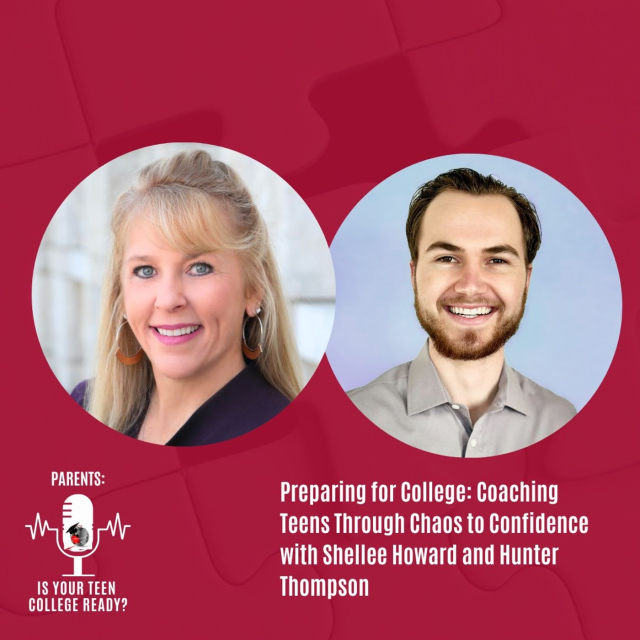
When it comes to preparing teens for college and life beyond the classroom, two unique perspectives come together in a powerful way. Shelley Howard, host of Parents: Is Your Teen College Ready?, sat down with former student turned coach Hunter Thompson to explore the challenges today’s students face and how intentional coaching can make all the difference. Shelley focuses primarily on the college prep process—applications, essays, and everything that helps students get admitted to the right schools. Hunter, on the other hand, works with young people on the deeper skills: resilience, self-awareness, and character development that sustain success long after the acceptance letter arrives.
Hunter’s story is both relatable and inspiring. A star golfer in high school, he went on to play college golf in Florida, even serving as team captain. But by his sophomore year, he realized that golf was not a sustainable career path. This realization triggered an identity crisis, forcing him to ask tough questions about who he was outside of sports. His curiosity led him into philosophy and finance, and eventually to one of his greatest breakthroughs: overcoming a fear of public speaking in a college speech class. That moment of facing his fears lit a spark. Within three years, Hunter founded the Thompson Coaching Company, delivered a TEDx talk, hosted live events, and built a growing practice centered on helping students navigate their own journeys.
The challenges students face today are uniquely complex. From limitless choices and information overload to constant comparison on social media, many young people struggle with overwhelm, anxiety, and even depression. Add in the generational disconnect—parents raised in a pre-smartphone world guiding kids who live with 24/7 digital access—and the gap only widens. Hunter points out that one of the biggest missing pieces is accessible accountability partners who truly understand the pressures of this generation.
Hunter’s coaching philosophy centers on resilience and self-discovery. He believes that voluntarily facing hard things builds the mental and emotional muscle to overcome future challenges. His work with students isn’t about handing out answers; instead, he guides them with questions, helping them uncover their own values, strengths, weaknesses, and aspirations. The goal is for students to build confidence and sustainable habits while parents stay informed and supported through regular updates and collaboration.
But how do you know if a student might benefit from coaching? Often, the signs show up in everyday conflicts: resistance to basic routines, parent-child arguments, missed assignments, or disengagement. Parents’ intuition is key, especially in recognizing that today’s stressors are unlike those of past generations.
Hunter structures his programs with flexibility, offering three-, six-, and nine-month options depending on a student’s readiness and goals. Sessions are highly personalized—sometimes starting with something as simple as creating a consistent morning routine, other times focusing on helping athletes reframe how they process feedback. Parents are included in the journey, and tools like personality assessments may be used to align coaching strategies with student needs.
To illustrate, Hunter shared a few common coaching scenarios. For the overwhelmed student, narrowing focus and reducing decision fatigue helps strengthen commitment. For disengaged students, identifying intrinsic interests and connecting tasks to a personal “why” reignites motivation. And for students struggling with feedback, he reframes critiques as opportunities, guiding them through targeted practice to rebuild confidence.
Shelley and Hunter’s conversation highlights a powerful truth: preparing teens for the future isn’t just about academics or college acceptance. It’s about equipping them with the mindset, habits, and resilience to thrive in an unpredictable world. Coaching, when done right, becomes not just guidance for the student—but a partnership that uplifts the whole family.
Highlights
- Two experts, two perspectives: Shelley Howard guides families through the college prep process, while Hunter Thompson helps students build life skills, resilience, and character.
- Hunter’s personal transformation: From college golf captain to facing an identity crisis, overcoming fear of public speaking, and ultimately launching a thriving coaching company.
- Modern student struggles: Overwhelm, anxiety, depression, identity confusion, and the generational disconnect with parents raised in a pre-digital era.
- Coaching approach: Resilience through hard tasks, guided self-discovery, and collaborative support for both students and parents.
- Program design: Personalized one-on-one coaching, available in 3-, 6-, and 9-month formats, tailored to individual needs and readiness.
Key Insights
- Facing fears builds resilience – Hunter’s journey shows that growth often comes from stepping directly into discomfort.
- Students need accountability partners – Many lack mentors attuned to the pressures of social media, instant gratification, and limitless choices.
- Parents’ intuition matters – Recognizing small signs of conflict or disengagement can be an early signal that coaching support is needed.
- Self-discovery drives lasting motivation – Helping students uncover values, strengths, and a personal “why” leads to greater independence and confidence.
- Coaching supports the whole family – Effective coaching balances direct student support with parent collaboration, reducing friction and building trust at home.
Connect with Shellee Howard:
Website
YouTube
Instagram
LinkedIn
Connect with Hunter Thomas:
Website
YouTube
Instagram
LinkedIn
